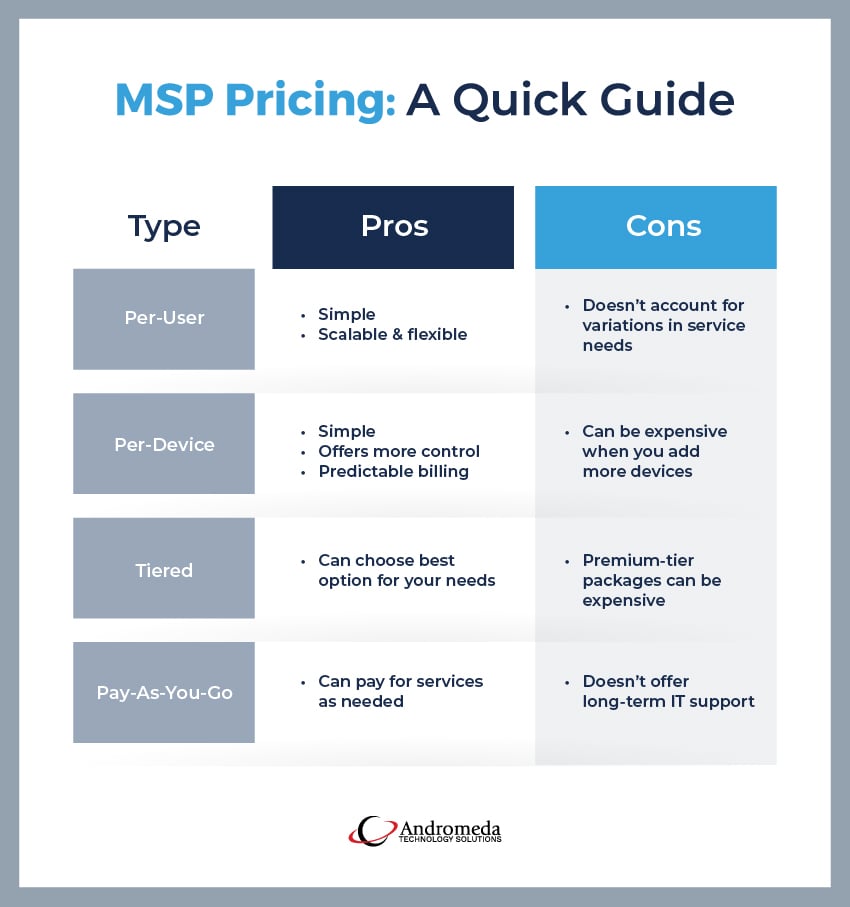
MSP Pricing: A Guide To Managed IT Services Pricing Models
Outsourcing your business's IT needs to a managed service provider (MSP) can reduce costs, improve efficiency, and give your teams more time to focus on strategic initiatives. A 2022 survey found that 88% of small and midsize businesses currently use or are planning to work with an MSP,1 so it's clear that many organizations depend on MSPs to streamline their IT infrastructure.
But with spending on managed services expected to account for 18% of IT budgets this year,2 finding a provider that offers the services you need with the right pricing model will be vital for getting the most bang for your buck. In this blog, we'll break down the various MSP pricing models you might encounter and share tips for finding the best provider for your business.
MSP Pricing Considerations
Figuring out which MSP offers the best value for your business needs is essential. Managed services pricing can vary based on many different factors, so keep these considerations in mind when searching for a provider to work with:
Scope of Services
First, determine the specific services you need from your managed IT provider. If you're looking for several service offerings at once, such as cyber security services in addition to help desk support and mobile device management, you'll likely end up paying more than if you only need one or two services.
Service Level Targets (SLTs)
Providers often give customers service level agreements (SLAs), which are set as a worst-case number that’s designed not to be missed. Providers like Andromeda Technology Solutions that offer SLTs do so with the intent to better align provider goals with the goals of the customer.
Contract Length
MSPs may offer discounts for longer-term contracts, so consider whether you prefer a month-to-month arrangement or are willing to commit to a longer contract for potential savings.
Experience
The level of expertise your potential managed IT service provider has can affect pricing. Established providers with specialized skills may charge higher rates than newer MSPs, but they often provide higher-quality, more reliable services.
.jpg?width=1201&height=630&name=andromeda_blog_msppricingmodels_inline1%20(1).jpg)
What Factors Impact Managed Services Pricing?
Understanding the factors that impact costs in the managed services industry can help you better assess which pricing structure and provider are right for your business. A few factors that can affect managed services pricing include:
Number of Users and Devices
The total number of users and devices needing support, such as computers, servers, and mobile phones, will influence pricing. Having more users and devices typically results in paying higher costs.
Number of Locations
The size and complexity of your business's IT infrastructure can affect the cost. If you have a larger business with multiple locations and complex IT environments, you'll likely require more services – ultimately leading to higher pricing. If your business technically has no location – i.e., you’re fully remote or most of your users are remote – the same principle applies.
Customized Services
MSPs that offer customized services tailored to meet your unique business needs may have different pricing structures than providers that offer one-size-fits-all solutions.
Industry-Specific Requirements
Many industries have specific compliance and security standards that managed IT service providers must meet. In some cases, meeting these requirements comes at additional costs.
On-Site vs. Remote Support
On-site support services might cost your business more due to travel expenses and the time involved, so determine whether you need support technicians available to come on-site or if remote support will meet your needs.
What Are Common MSP Pricing Models?
MSPs typically offer choices when it comes to pricing models to accommodate different business needs, and each comes with its own advantages and considerations. These are often flat-rate pricing models for complete service packages with all the managed IT services your business needs. Flat-rate pricing simplifies billing and budgeting since there aren't any additional fees for specific services, so smaller businesses with predictable monthly IT needs often prefer it.
Here are some popular pricing models used by MSPs:
Per-User Pricing
In the per-user pricing model, your MSP will charge a fixed fee for each user or employee that requires IT support and services each month. It's a simplified pricing strategy that allows for more scalability as your business grows, but it doesn't always account for variations in the level of IT services individual users in your organization may need.
Per-Device Pricing
The per-device pricing model involves paying a fixed monthly fee for each device in your business that your MSP manages and supports. It's helpful for businesses that have a consistent number of devices each month, but it might become expensive if you have a high device-to-user ratio.
Tiered Pricing
With a tiered pricing model, your MSP will provide different packages that include predefined services and costs. Higher-tier packages typically include more comprehensive services at a higher cost, but you can choose the package that best fits your needs and is within your budget.
Pay-As-You-Go
Pay-as-you-go pricing, or the a la carte pricing model, allows you to pay for IT services only when you need to use them. It's an ideal pricing structure if you only need occasional support or help with short-term projects, but it may not be cost-effective if you're looking for ongoing services.

Types and Components of Managed IT Services
MSPs offer a range of IT services designed to deliver proactive, ongoing support for your IT infrastructure and systems. The specific types of services will vary depending on your provider, but here are some common services offered:
Network Infrastructure Management
Network infrastructure management services typically involve setting up, monitoring, maintaining, and troubleshooting business networks. They can include professional consultation and design services to build a network that can meet your needs long-term, along with installation, remote monitoring, ongoing management, and alerting services to ensure your business is always connected and operating smoothly.
Device Patching & Maintenance
The right MSP can help you get out of break/fix mode with comprehensive device patching and maintenance services. They can take tedious tasks like hardware upgrades, patch management, and software updates off your in-house team's shoulders, so you can rest easy knowing your systems and applications are always secure and performing optimally while your IT staff focuses on other important tasks.
Workstation Management
Managing remote workers can be complex and time-consuming, especially when it comes to ensuring their systems and devices are secure and reliable. Some MSPs offer workstation support services to help your employees get fast, secure access to company resources from anywhere with ongoing monitoring and maintenance.
Managed Endpoint Security
Remote and hybrid workforces expand the network perimeter, leaving your business open to more cyber attacks than ever. With managed endpoint security services, your MSP can configure security settings, enforce compliance policies, and help you mitigate risks introduced by dispersed IT environments.
Mobile Device Management
MSPs can make it easier to manage and secure mobile devices connected to your network with mobile device management (MDM) services, which help ensure each network-connected device complies with your company's security policies at all times.
Help Desk Support
MSPs often offer help desk support to assist your staff and other end-users with IT issues and questions. This support can range from basic troubleshooting to more in-depth technical support for complex situations.
Managed Cloud Services
Cloud management services can include migration support and managing your cloud storage, computing, and software-as-a-service (SaaS) applications. These services help keep your data secure and your cloud services running at peak performance.
Disaster Recovery Services
Managed IT services often include disaster recovery measures, such as regular data backup services, to help prevent data loss and ensure business continuity in case of a system failure or network outage.
Professional Services
Some MSPs offer professional services, such as IT , project management support, or staff augmentation services, to assist businesses that need help tacklinconsultationg one-off technology projects or issues. These services are designed to help your business get the right level of advanced support to meet IT-related goals or future-proof your technology solutions.
Benefits of Working With Managed Service Providers
Working with an MSP delivers many benefits to businesses of all sizes. Here are some of the top advantages of partnering with the right MSP:
Proactive Support
Since MSPs monitor and manage your IT systems, they can quickly identify and address issues before they become major problems for your business. This proactive approach can help you get out of the break/fix cycle and minimize the impact of IT disruptions or unplanned downtime.
Cost Savings
For businesses that don't already have an in-house IT team, MSPs offer a cost-effective alternative to hiring and maintaining these specialized positions. One study found that 46% of organizations that work with an MSP save 25% or more on IT costs annually.3 Partnering with an MSP offers access to diverse IT expertise and service offerings without paying full-time salaries, benefits, and training for full-time staff.
.jpg?width=1200&height=630&name=andromeda_blog_msppricingmodels_inline3%20(1).jpg)
Specialized Expertise
MSPs offer specialized expertise in several different areas of IT, including cyber security, network management, and more, which you can leverage to supplement your in-house IT team's skillsets.
More Time in the Day
Outsourcing IT management to an MSP gives your IT staff time back in the day to focus on more strategic initiatives. With your MSP managing day-to-day IT needs, your team won't be bogged down by tedious tasks or troubleshooting requests.
Advanced Technologies
MSPs make sure to stay up-to-date with the latest technology trends, and they can provide access to the newest tools and solutions that may be difficult for your business to obtain or implement on your own.
Reduced Downtime
The average cost of downtime was $1,467 per minute in 2022.4 Working with an MSP can significantly reduce unplanned network downtime, thanks to ongoing monitoring, alerting services, and fast issue resolution. And lower expenses aren't the only benefit of reduced downtime; it can also improve employee productivity and customer satisfaction.
Strategic IT Planning
Through IT consulting and strategic planning services, MSPs can help you align your technology investments and business goals to make better-informed decisions about your IT infrastructure.
What Should You Look For in a Managed Services Provider?
The right MSP can share reliable IT knowledge and support as a valuable strategic partner for your business. Here are some factors to consider when choosing an MSP to work with:
Availability
Working with an MSP that doesn't have enough availability to provide responsive service will leave you frustrated. Before choosing an MSP, ask about their response times and make sure they can provide the level of support you need.
Flexibility
Your MSP should be able to grow with you as your business grows. Consider working with a provider whose services are scalable and flexible enough to keep up with your changing needs.
Industry Expertise
Every industry has unique IT needs, so finding an MSP who has experience working with other businesses like yours is important for getting the highest quality of service. An MSP with industry-specific knowledge can also provide insights into overcoming your unique IT challenges and meeting compliance requirements.
Reputation
Working with an MSP that consistently receives positive customer feedback can give you confidence in their service delivery, so seek out social proof in the form of references or testimonials from other businesses in your industry.
Maximize Your Network With Andromeda’s Managed IT Services
Pricing structure is an important consideration when searching for an MSP, especially for businesses seeking a competitive advantage. However, opting for the cheapest choice may not deliver everything your organization needs to reap the full benefits of managed services. If you're looking into MSPs, choosing a team with a solid reputation for helping other companies in your industry grow should be your highest priority.
For the past 30 years, Andromeda Technology Solutions has provided out-of-this-world IT services to businesses across multiple industries. Our managed IT services are delivered by people-first, trusted network infrastructure experts who can help you take a proactive – not reactive – approach to overcoming your IT challenges. Contact us today to get started.
Sources:
- https://www.channelfutures.com/business-models/smes-fueling-msp-growth-according-to-jumpcloud-research
- https://swzd.com/resources/state-of-it
- https://techvera.com/5-ways-youll-save-money-by-outsourcing-it-to-a-managed-service-provider
- https://www.comparitech.com/data-recovery-software/disaster-recovery-data-loss-statistics
Keep Your Business Safe, Secure, and Running
We’ll take a proactive approach to your manufacturing IT – and help your business blast off.





